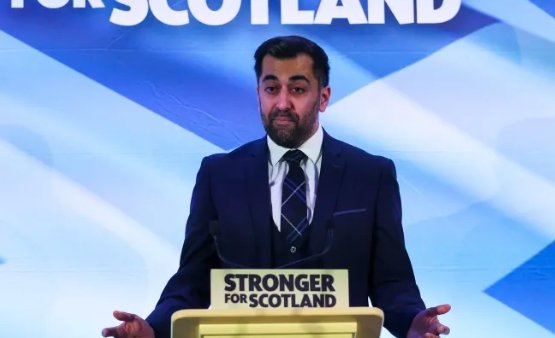The Scottish National Party (SNP) has launched its general election campaign with a new slogan: “Scotland’s Remain party”. The party aims to position itself as the main opposition to the UK government and the main advocate for Scottish independence.
SNP leader Humza Yousaf: ‘Brexit is a bad thing’
The SNP leader, Humza Yousaf, who was elected unopposed in March after Nicola Sturgeon resigned, said that Brexit was a bad thing for Scotland and the UK. He said that Brexit was the result of a broken Westminster system that could not be reformed, and that Scotland needed to leave Westminster through the door marked independence.
He said: “Brexit is a bad thing. It has caused division, uncertainty and hardship for millions of people in Scotland and across the UK. It has also weakened our economy, our environment and our security. Brexit is the creature of a Westminster system that cannot be reformed; Scotland must leave Westminster through the door marked independence.”
He added: “That is why we are running as Scotland’s Remain party in this election. We want to reverse Brexit and restore our place in Europe. We want to protect our rights, our values and our future as an independent nation.”
SNP’s plan for independence referendum
The SNP has also outlined its plan for holding another Scottish independence referendum if it wins enough seats in the next general election. The party has set a target of winning at least 29 seats out of 59 in Scotland, which would give it an overall majority of 65 seats in the House of Commons.

The party’s plan is based on using the next general election result to push for a second independence referendum, which would ask voters whether they want Scotland to become an independent country or remain part of the UK.
The party’s plan was voted through overwhelmingly at its annual conference held in Aberdeen on 16 October. It was supported by all three candidates who stood for the leadership: Humza Yousaf, Ash Regan and Kate Forbes.
SNP faces challenges from Labour and Greens
The SNP faces several challenges from other parties in this election, especially from Labour and the Greens. Labour hopes to capitalise on its improved performance under Anas Sarwar, who became its leader in May after Keir Starmer became prime minister.
Labour also hopes to benefit from Starmer’s growing proximity to No 10 and his support for devolution reforms. Labour has pledged to hold another Scottish independence referendum if it wins enough seats at Westminster.
The Greens have also gained ground since forming a power-sharing agreement with Labour at Holyrood last year. The Greens have campaigned on issues such as climate change, social justice and health care reform.
The other parties that are contesting this election include:
- The Liberal Democrats (LD), led by Willie Rennie
- The Conservatives ©, led by Boris Johnson
- The Scottish Conservatives (SC), led by Douglas Ross
- The Scottish Labour Party (SLP), led by Anas Sarwar
- The Scottish Greens (SG), led by Lorna Slater
- The Scottish Liberal Democrats (SLD), led by Alex Salmond
- The Scottish Conservatives (SC), led by Douglas Ross
- Plaid Cymru (PC), led by Adam Price
- The Alliance Party of Northern Ireland (APNI), led by Alasdair McDonnell
The next general election is expected to be held in May 2024, but it could be brought forward if there is no clear majority at Westminster or if there is another vote of no confidence against Starmer.


















